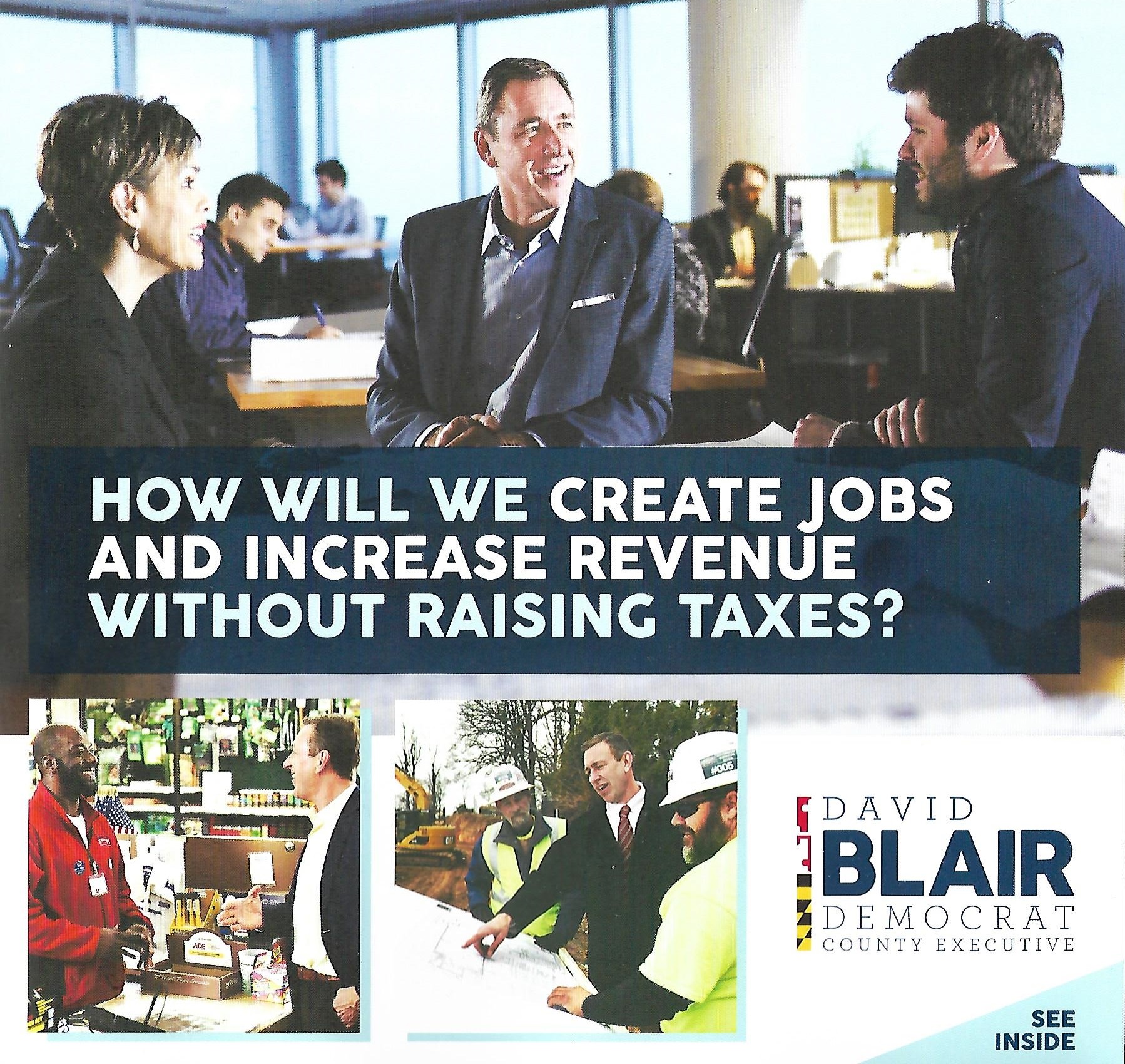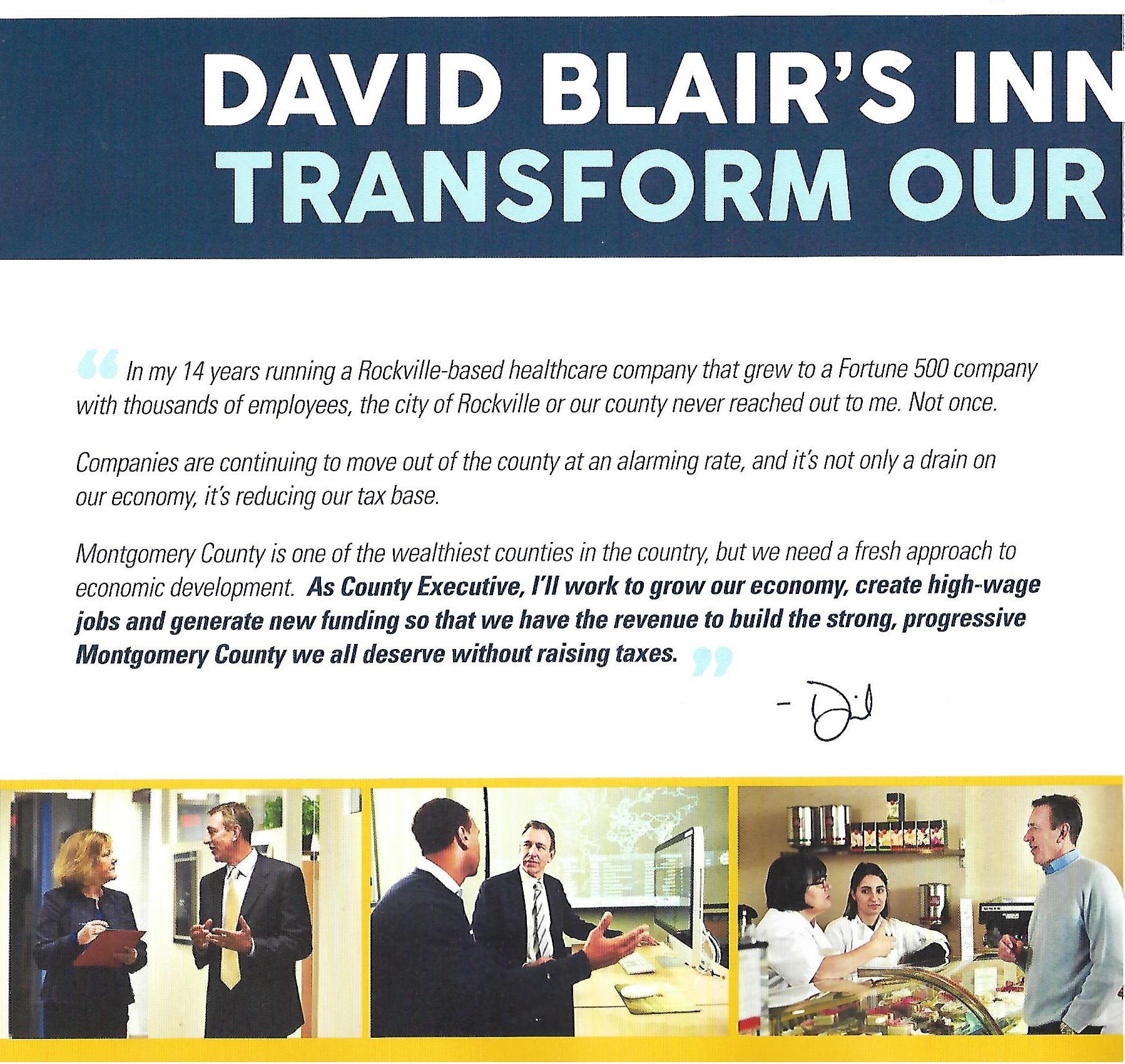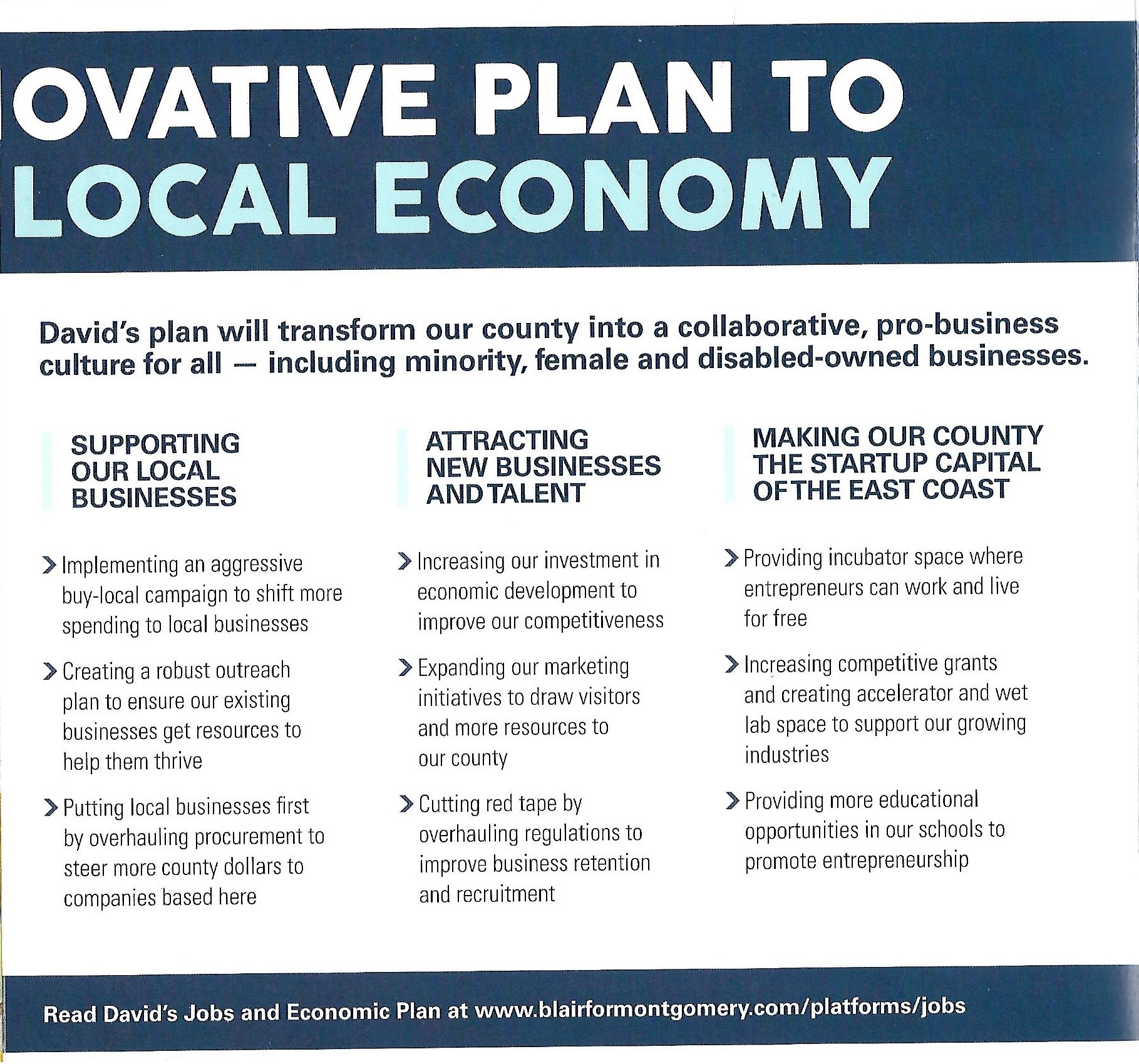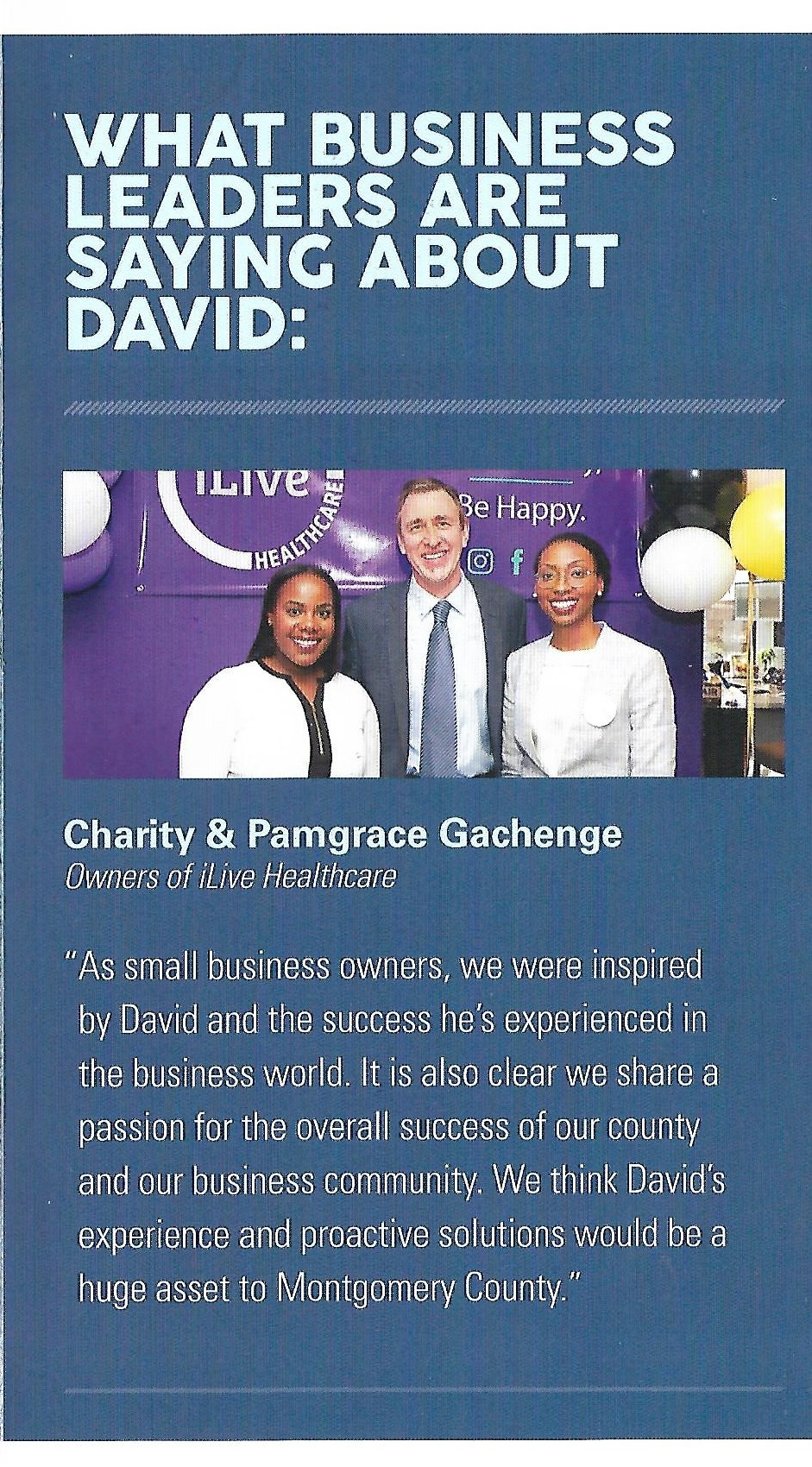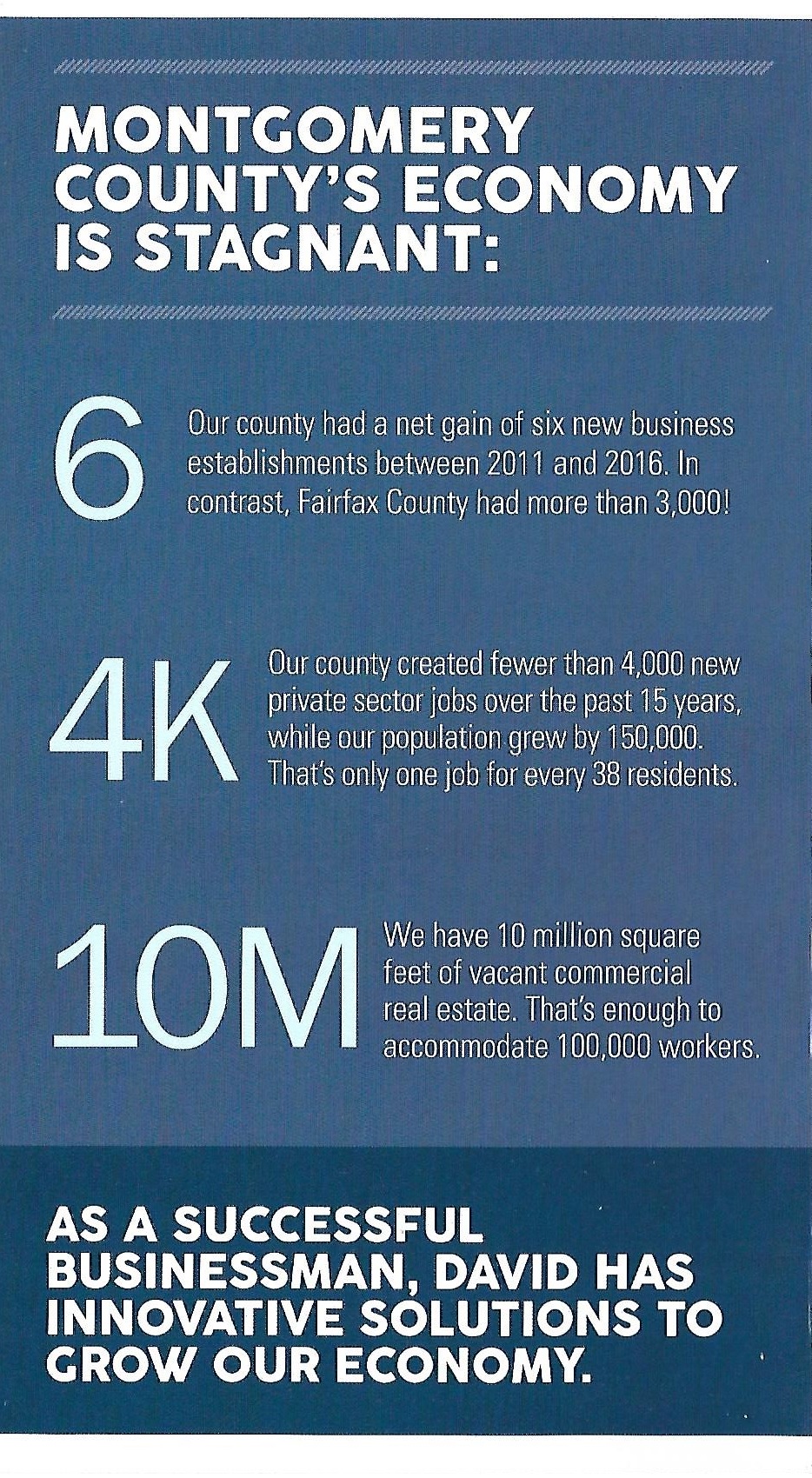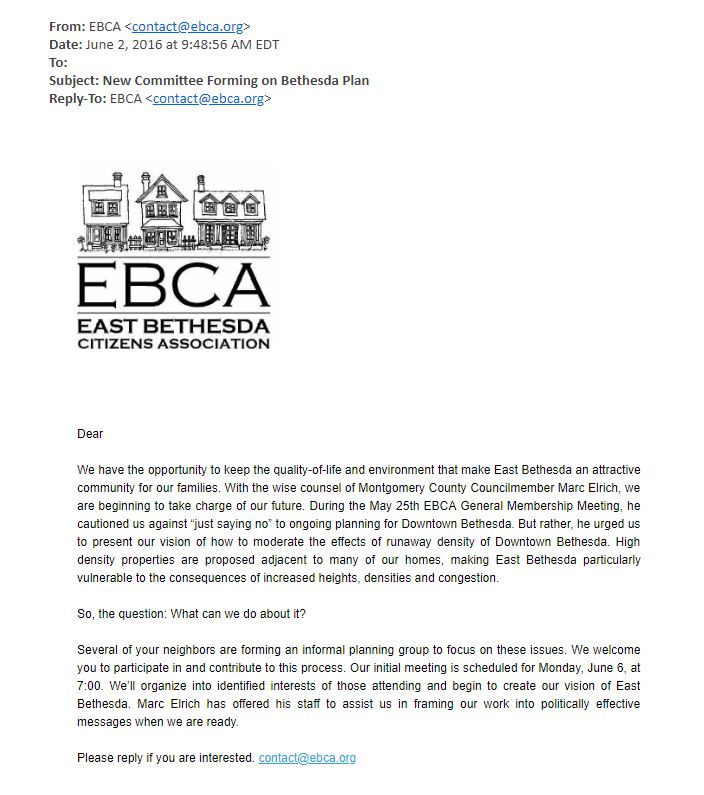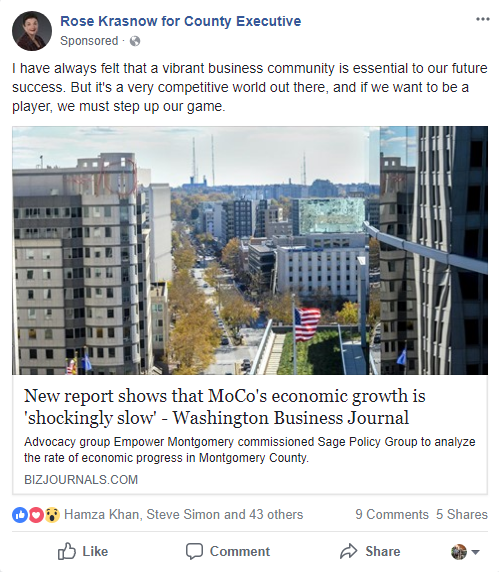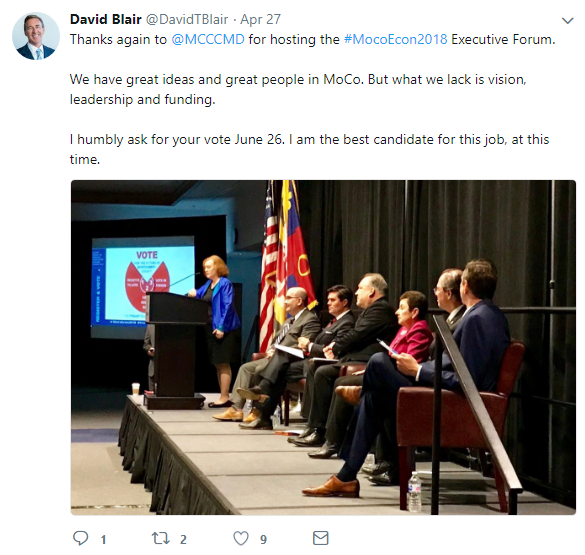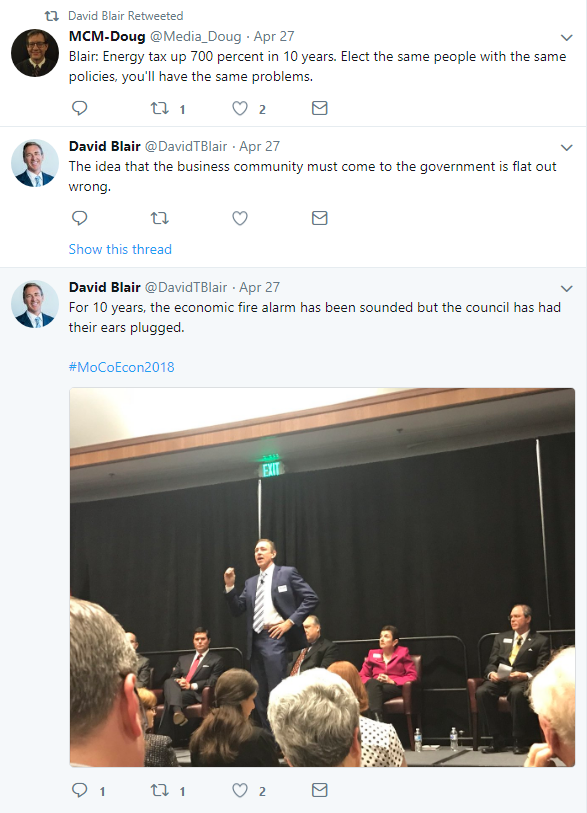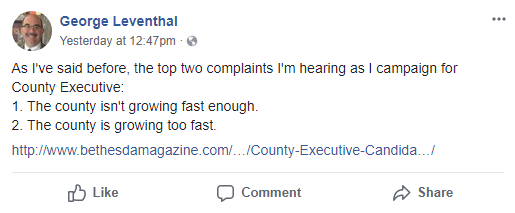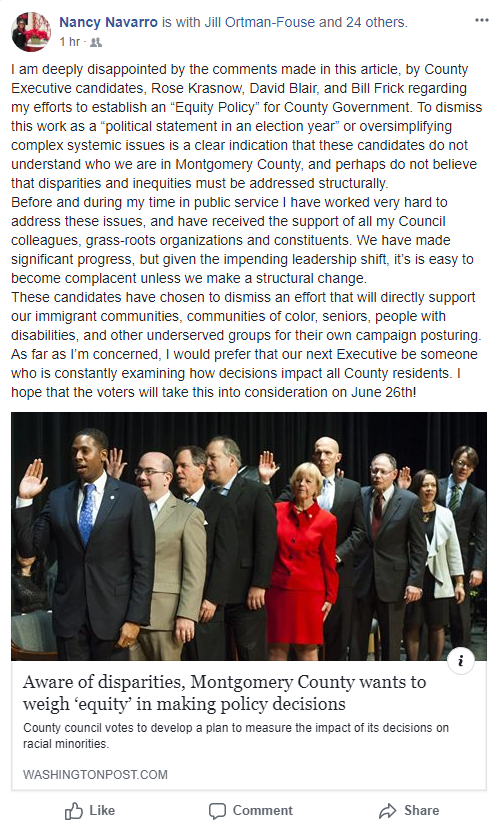Council Member Roger Berliner, who is running for Executive, is running this TV ad equating businessman David Blair with Donald Trump.
Tag Archives: David Blair
Asian Pacific American Dems Endorse Blair
The Coalition of Asian Pacific American Democrats (CAPAD) has endorsed David Blair for County Executive. Their endorsement statement emphasizes economic issues, including the need to “support minority small businesses.” The county has thousands of businesses owned by people of East Asian and South Asian descent. We reprint Blair’s email below.
Campaign Finance Reports: County Executive, May 2018
By Adam Pagnucco.
The May campaign finance reports are in and we will start breaking them down with the County Executive race. A note on methodology. First, we calculate total raised and total spent across the entire cycle and not just over the course of one report period. Second, we separate self-funding from funds raised from others. Self-funding includes money from spouses. Third, for publicly financed candidates, we include public matching fund distributions that have been requested but not deposited in raised money and in the column entitled “Cash Balance With Requested Public Contributions.” That gives you a better idea of the true financial position of publicly financed campaigns.
Below is our fundraising summary for the County Executive candidates.
Council Member Roger Berliner (whom your author supports) is the leader in money raised other than self-funding and also in cash on hand. He is closing in on a million dollars raised for the race, which was roughly Ike Leggett’s total in 2006. He has enough money to be heard in the final month.
Council Member Marc Elrich is the leader among the publicly financed candidates. His total raised of $745,352 is almost five times what he raised in his 2014 council race when public financing was not yet available. Elrich has a long history of vastly outperforming his fundraising because of his large and loyal base of supporters, some of whom have been with him for decades. With more than $400,000 to spend in the final month, he won’t blow anyone out, but he can combine that with a grass-roots field program to finish strong.
Businessman David Blair is going to break Steve Silverman’s fundraising record in 2006 with more than $2 million. The difference is that Silverman raised his money from the business community while Blair is mostly a self-funder. Blair’s self-financing of $1.9 million sends a message that he is deadly serious about winning. He is the strongest of the outsider candidates.
Council Member George Leventhal will get votes because of his longevity, name recognition and sheer hard work in the campaign cycle. (His brilliant Avengers-themed video could get some votes too!) But he doesn’t have enough resources to make a big push at the end.
Former Mayor of Rockville Rose Krasnow is a substantive and knowledgeable candidate who impresses those she meets. But she made two big mistakes in this campaign: getting in late and using public financing. Those mistakes reinforce each other. If she had gotten in early, she might have been able to raise enough in public financing to compete with the totals accumulated by Elrich and Leventhal. Since she did get in late, traditional financing offered a better option to raise money in a hurry. Now she is in the same situation as Leventhal and Bill Frick: struggling to make a final push.
Your author likes Delegate Bill Frick (D-16) a lot personally but he doesn’t have the resources to make his case. We wish Frick had stayed in the House of Delegates and plotted a course to succeed his former district mate, Brian Frosh, as Attorney General. The path not taken will be harder now.
Republican Robin Ficker has applied for public financing, but as of this writing, we don’t know whether he will receive it.
Overall, there are two competing narratives among those who are really focused on this race – admittedly, a minority of the voters. First, there is the view that the county should be more progressive. It should be bolder about closing the achievement gap, do more to help vulnerable residents (including renters), institute tougher environmental protections and push back against the influence of developers and big businesses. People with that perspective are mostly rallying behind Elrich, who is the overwhelming choice of progressive endorsing organizations.
Then there is the narrative advanced by your author’s writings on the county budget and the economy, the Washington Post’s endorsement editorials and the now-famous report by Sage Policy Group: to pay for progressive priorities, the county needs a stronger tax base. That message plays more to the outsider candidates, especially Blair, who put it in a recent mailer. But there’s no reason why Berliner and Leventhal shouldn’t embrace that perspective too.
It’s important to recognize that these views are not mutually exclusive. Not all progressives are skeptical of economic growth. And not all people who would like to see a stronger economy oppose spending the resulting revenue on progressive priorities. But the two messages contain differences in emphasis and differences in potential for attracting blocs of voters. Both of them represent change in some form, implying that running on resume and experience won’t be enough in this cycle – at least not in the Executive contest. Everyone needs to pick a path forward to win.
Next: the Council At-Large race.
David Blair Calls the Question
By Adam Pagnucco.
In a mailer with a headline your author could have written, County Executive candidate David Blair asks, “How will we create jobs and increase revenue without raising taxes?” Regardless of whether one supports Blair, this is the right question to ask if we are to maintain our quality of life and pay for progressive priorities.
Disclosure: your author supports Roger Berliner.
What the Post’s Endorsement of Blair Means
By Adam Pagnucco.
The Washington Post’s endorsement of businessman David Blair hit like a grenade this past weekend, blowing up the County Executive race. What does it mean?
First, in reading the language of the Post’s endorsement, we are struck by how closely their views on the challenges facing the county resemble our own. The majority of these opening three paragraphs mirror what we have been writing about the county economy for years.
These seem like boom times in Montgomery County, the mainly rich suburb that has absorbed roughly 100,000 new residents since 2010 to a population now approaching 1.1 million. Amazon (whose CEO, Jeffrey P. Bezos, owns The Post) has shortlisted the county for its second corporate headquarters; construction cranes tower over Bethesda and Silver Spring; and the public school system, one of the nation’s largest, includes some of the best high schools anywhere.
That’s why it’s easy to overlook some ominous signs of fiscal and economic trouble ahead. A burgeoning population of retirees, immigrants and other less affluent residents has strained local resources and budgets. Those moving into the county tend to be poorer than those leaving. The chasm between economically prosperous pockets (such as the ones dominated by cranes) and stagnant ones is widening. Most worrying, business and job growth are anemic.
That’s the unsettling backdrop for the June 26 Democratic primary, which is likely to determine who will run the county for the next four years. County Executive Isiah Leggett, a deft and capable manager, is retiring after 12 years in the job (and no Republican has won an election in Montgomery since 2002). The central question is which of the candidates for county executive is most capable of juicing a sluggish commercial environment — the only way to broaden the local tax base so it can sustain the county’s excellent schools and progressive services.
The Post framed the election’s central question correctly. And their policy view, clearly established in the language above, will no doubt influence their choices for County Council. That said, they do not share your author’s view that governing experience is useful for addressing these challenges. So be it.
The Post has a pretty good record in top-tier MoCo Democratic primaries. They endorsed Chris Van Hollen (CD-8) in 2002, Ike Leggett (County Executive) in 2006 and 2014 and John Delaney (CD-6) in 2012. They also endorsed Kathleen Matthews (CD-8) in 2016, who finished third.
Even so, the Post is not a king-maker; one of the good things about MoCo politics is that we have no king-makers here. But their endorsement matters, especially when five candidates are vying to be the chief rival for Marc Elrich. Consider what Roger Berliner (your author’s choice), Bill Frick or Rose Krasnow would have said if they had gotten the Post endorsement. If Berliner had received it, he would have told non-Elrich voters, “I am the one who combines the Sierra Club, moderates, District 1 voters and now the Post. I’m the alternative to Elrich.” Frick would have said something similar while substituting realtors for the Sierra Club. If Krasnow had received it, she would have said, “I am the only woman in a primary in which sixty percent of voters will be women and now I have the Post. I’m the alternative to Elrich.” None of these things can be said now. All three lose the opportunity to leverage the Post endorsement to expand outside their geographic bases.
It is sometimes said that Elrich has a ceiling. Some voters will find a decades-long socialist who equates transit-oriented development with ethnic cleansing and favors rent control unappealing. But Blair has a ceiling too. That was expressed by a commenter on Seventh State’s Facebook page who wrote, “I don’t want a businessman political newcomer who is trying to buy the election.” Fair or not, that is a common sentiment among Democratic activists, and those who feel this way are not persuadable on this point. Blair can send them thirty mailers and they won’t budge. How many rank-and-file voters have this view? David Trone, who shares this handicap, received 22% of MoCo’s vote in the 2016 Congressional District 8 race. That’s an imperfect analogy because CD8 omits some relatively moderate areas in MoCo’s Upcounty and Trone was not talking about the unpopular nine percent property tax hike in his campaign. Still, Blair will need more than 22% to win.
Besides Blair, the other big winner from the Post’s endorsement is Elrich. Elrich has been crusading against rival candidates who have been supported by wealthy businessmen for years; now he gets an ACTUAL wealthy businessman as perhaps his chief opponent. Elrich is no doubt rubbing his hands together in glee as his progressive hordes gird for battle against plutocracy. His field coordinator must be dizzy with joy.
Both the Elrich and Blair campaigns need to consider the following question. Which group is larger in the Democratic primary electorate: the people who believe that taxes have gone up but their service quality has not or the people in Elrich’s base? If the former outnumber the latter – not an impossible prospect considering that a majority of Democrats voted for term limits two years ago – then maybe an outsider has a shot. It would be totally unprecedented given that every prior MoCo Executive has had governing experience before assuming office. But Robin Ficker winning a charter amendment vote by forty points was also unprecedented.
Thanks to the Post, a wild election has gotten a little wilder. There are only forty-three days to go before this story reaches its momentous conclusion!
Washington Post Endorses Blair for Executive
The Washington Post has endorsed David Blair for Montgomery County Executive. Read their endorsement here.
The Not Marcs
Marc Elrich has cornered the progressive market in the county executive race. He has scooped up the lion’s share of endorsements from progressive groups and unions, and stands out as the most left-wing candidate in the race. Marc’s civic activism around the county has also won him a great many fans.
As Adam outlined yesterday, the challenge for the other candidates is to emerge as the alternative. Who is best positioned to do this?
Roger Berliner is probably the best County establishment candidate. After several terms on the Council, he has compiled a highly marketable record of leadership on environmental issues, especially for voters who are more concerned about climate change than economic equality. We’re a wealthy county, so even in a Democratic primary, there are lot of these voters.
Roger’s challenge is building a larger coalition is his record on business concerns. He has steered a middle course on these issues, which may be where many county voters are, but impedes him being a convincing champion of business or change. Roger is doing his best to make the case that he’s the person to lead on innovation and reinventing county government but it’s a hard sell for a multi-term councilmember.
George Leventhal’s comments on Facebook after the recent business forum reporting that he hears complaints about too much and too little growth from different people pretty much capture it all. Candidates simply cannot come across as annoyed with voters. What do those people want anyway?
Even more bizarre was George’s comment at the forum: “Democracy is not a spectator sport. If the business community wants to be heard, you have to speak to us.” Really? After 16 years on the Council, you have no idea what the business community thinks? They have lobbyists and are often highly engaged with the process. Politics is about addition, not subtraction.
Rose Krasnow has some clear strengths in the race. She’s the only female candidate in the #metoo election, though sometimes she sells it a little too hard. Her time as Mayor of Rockville, working on Wall Street, and as a senior staffer at the Planning Board allow her to make a very convincing case that she has the experience to lead the county in a new direction. The Planning Board is a great place to meet a lot of leaders around the county, especially in the not always popular but well-funded development community.
While Democrats are often not too keen on Wall Street, Rose’s real problem, ironically, is her identification with the Planning Board. It’s like flypaper for all the problems in the county and almost worse than being an incumbent when voters are in a mood to shake things up. Too much traffic? Too many portable classrooms? Blame the Planning Board. It may not always be fair (or unfair) but if you want fair, politics is the wrong line of work.
Businessman David Blair is certainly making a splash around the county. He’s already on TV and sending out mail, giving him profile among county voters as a sunny guy in a way that resembles David Trone’s last congressional bid. Empower Montgomery, which he helped found, seems ready to launch an independent expenditure campaign on his behalf.
If he spends enough, he could well become the not Marc. Of course, he’s going to have to compete with David Trone who will also be filling our airwaves. There is also the question of how many rich businessmen do Democrats want to elevate in the days of Trump. Still, I’ve heard positive feedback from some about his business plans, though his press interviews have at times demonstrated a lack of fluency with issues or government. Could this stall his campaign once he faces greater scrutiny?
Last but not least, Delegate Bill Frick is an interesting candidate. Although he’s an elected official, he is not associated with county government, so doesn’t carry their baggage. In short, he manages to combine appealing experience without the blame – a combo that worked rather well for former Rockville Mayor Doug Duncan. As someone widely seen as smart and a good, often passionate speaker, he ought to be an appealing candidate.
So far, however, his campaign has yet to catch fire. Insiders ding him for switching races but I seriously doubt voters know or care. He needs an issue and the county’s strongly disliked liquor monopoly looks like a good target notwithstanding the mud MCGEO has thrown at him. Frick needs convince voters, donors and opinion leaders opposed to Marc that he is best positioned to unite an alternative coalition to renovate county government. He has a good case.
The Executive Contest is a Two-Candidate Race
By Adam Pagnucco.
The Washington Post recently published an article declaring that the contest to succeed County Executive Ike Leggett was seen as “anybody’s race.” Pshaw! One of two candidates will win it. One of them is Council Member Marc Elrich, who finished first in the last two Council At-Large primaries and is nearly sweeping progressive endorsements. The other is…
We don’t know yet. And we don’t know if we ever will.
During the 2016 Congressional District 8 race, your author called up one of the smartest people in state politics we know. This fellow lives outside MoCo but he tracks all parts of the state and has sources everywhere. When we asked him who was going to win, he said, “When I talk to the various campaigns, all of them say they’re gonna be the last one at the end along with Jamie Raskin. When I hear that over and over, when I see that they all think that Jamie is the man to beat, that leads me to think Jamie will win.” That dynamic is going on now in the Executive race.
Elrich’s long-time message combining opposition to development with far-left progressivism has earned him an overlapping base of land-use voters, liberals and Downcounty residents, especially in and near Takoma Park, where he served 19 years on the City Council. In the 2014 Council At-Large race, Elrich finished first in every council district except 2 (where he finished second to Nancy Floreen) and first or second in every local area in the county except Damascus and Laytonsville. He finished first in 138 of 251 precincts. In the 2010 Council At-Large race, Elrich finished first in all five council districts and in every local area in the county except Cabin John, Damascus, Darnestown and Laytonsville. He finished first in 166 of 243 precincts. No other MoCo politician running for county office in this cycle has a base of this kind.
How did he assemble it? For many years, Elrich has been assisting residents who oppose master plans all over the county. And whether they won or lost, those development opponents came away from the fight with Elrich as their hero. Here is an illustration: an email sent out by the East Bethesda Citizens Association on 6/2/16, on the eve of the council’s consideration of the Downtown Bethesda Master Plan, describing their meeting with Elrich and calling for action:
A year later, Elrich cast the lone vote against that master plan as he has with several other plans. This plan’s opponents have now been incorporated into Elrich’s base – assuming they were not part of it already.
While other candidates struggle to attract volunteers, Elrich’s volunteer base is well established. In 2014, the campaigns of Elrich and his ally, Beth Daly, posted poll coverage sign-ups on Signupgenius.com. They were able to recruit coverage on 67 precincts, many on more than one shift, with particular strength in the voter-rich areas of Silver Spring, Takoma Park and Leisure World. No one other than the Apple Ballot could touch this. Now that he is running for the county’s highest office, how many precincts will Elrich be able to cover?
Among the influencers and highly informed activists, this election is rapidly becoming defined by whether you’re with Elrich or not. If you don’t believe us, check out the Council District 1 candidates. They’re an interesting group that collectively spans the differences of opinions in the county district containing the most Democrats. Bethesda Magazine reporter Andrew Metcalf asked them during a recent debate for whom each was going to vote in the Executive election. After significant prodding, here’s how the candidates responded:
Bill Cook – would vote for Marc Elrich
Pete Fosselman – undecided; wouldn’t vote for Elrich
Andrew Friedson – undecided; disinclined to vote for Elrich
Ana Sol Gutierrez – torn between Elrich and George Leventhal
Jim McGee – would probably vote for Elrich
Reggie Oldak – refused to say; would not vote for Elrich
Dalbin Osorio – would vote for Elrich
Meredith Wellington – undecided
All of the non-Elrich candidates have potential as well as challenges. Council Members Roger Berliner and George Leventhal are running on their experience and qualifications. (Disclosure: your author respects both but supports Berliner.) Berliner is trying to get known outside his council district and Leventhal has been severely out-polled by Elrich in the last two elections. Delegate Bill Frick, former Rockville Mayor Rose Krasnow and businessman David Blair are the fresh faces. But they are little-known in most parts of the county and Blair started as a complete unknown. All of these candidates have a long way to go and each of them is in the others’ way.
To contrast with Elrich effectively, a non-Elrich candidate needs to hit this sweet spot dead-on: “We live in a great county, but we can be even better. Here are some ways we can improve.” That involves a bit of threading the needle for the two council incumbents. It’s understandable that they might react to critiques of the county’s economic performance as criticism of their records, but they should think of it like this: every Executive leaves unfinished business for the next Executive. Ike Leggett inherited his share of problems from Doug Duncan, who in turn inherited some issues from Neal Potter. This is entirely normal, so who is the best choice to lead in the future? As for the non-incumbents, they aggressively point to the need to improve, but they tend not to have many specific proposals to get better because they don’t know the history and operations of county government as well as the two Council Members. To be fair, how could they? If no one hits this sweet spot, that leaves Elrich as the only candidate with a crystal-clear message that is distinct from the others. Those who hear Elrich’s message and agree with it are less likely to peel off to someone else than tentative supporters of the other candidates who might change their preferences between them.
One more thing: we wouldn’t be surprised if most, if not all, of the non-Elrich candidates have polled. If so, they all probably found similar results. And so they could all tailor their messages in similar ways and maybe even say the exact same things. That would blur the differences between them and make Elrich stand out even more. This may already be happening as Berliner, Blair and Frick all repeatedly mentioned “innovation” at last Friday’s Executive forum. Was that a coincidence?
If questioned privately, we bet all of the non-Elrich candidates would grudgingly admit that it’s a problem that five of them are in the race. Each of them wants to be the person who gets to take on Elrich one-on-one. So each of the five is looking at the others and saying, “If YOU all get out of the way, I can beat Elrich.” But no one is dropping out because they all think they have a shot. The big winner from this is – you guessed it – Marc Elrich.
One non-Elrich candidate needs to emerge from the pack and consolidate everyone that is not in Elrich’s camp. If that happens, Elrich is beatable. But if nothing changes and this election continues down the path it is on, Elrich will win with less than 40% of the vote.
Executive Candidates React to Sage Consulting Report on MoCo Economy
By Adam Pagnucco.
Last Friday, the candidates for County Executive attended a forum to discuss a report by Sage Consulting listing numerous problems with the county’s economy. Afterwards, most of the Executive candidates commented on the report and on the economy more generally via email and social media. Their responses say a lot about which ones take the economy seriously, an issue that has drawn much attention from Seventh State.
Council Member Roger Berliner (whom your author supports) sent out this email over the weekend.
Our county has serious work to do to improve our business climate, diversify our economy, and increase the number of good jobs. It must be Priority #1 if we are going to be able to meet the needs of our school system, reduce congestion, invest in public safety, and protect our environment.
I have a record that I am proud of on improving our economy and a vision for our future that you can read about here. Some of my competitors have records too. Others have just words. It’s important to consider what we have done in pursuit of increasing prosperity, not just what we say we will do.
My record includes leading the successful effort to reduce our energy tax three years in a row; creating the small business navigator and a micro-loan program to help our local small businesses and entrepreneurs thrive; and playing a leading role in our Amazon bid. My vision is of a forward leaning county that embraces innovation, education geared towards the jobs of tomorrow, and vibrant urban centers served by state-of-the-art transit.
Yesterday, a consultant tasked with assessing our business climate and outlook, issued a scathing report. It highlighted one startling statistic: that “between 2011 and 2016, the number of [business] establishments in Montgomery County increased by 6, or roughly the population of businesses at a strip mall.” The report concludes that “Montgomery County therefore desperately needs to step up efforts to expand its commercial tax base.” You will get no debate from me on that point.
At the same time, the report declares:
This should not be mistaken for an assertion that Montgomery County is anything other than the finest possible location for Amazon HQ2. It will be difficult for Amazon to identify an area that is as open to new ideas, offers such abundant human capital, is as saturated with transportation options, supports such high quality public education, is as institutionally rich, and is as committed to shared prosperity as Montgomery County, MD.
So, while it is true that we have our challenges, challenges that must be met head-on, it is also true that we have extraordinary assets and a quality of life to match. I will build on our assets as your next County Executive, work diligently to improve our business climate, and am 100% committed to expanding a “shared prosperity.”
Life is good in Montgomery County, but we can make it better still. That’s my goal: a “more perfect” Montgomery County.
In service,
Roger Berliner
Delegate Bill Frick (D-16) sent out this email hours after the Executive forum ended.
Something doesn’t add up. How does a county with our talent, our people, our great public schools and our values lag behind the rest of our region in job growth and economic development? How is it that private sector employment has declined by 12,500 jobs from 2006 to 2016? How is it that, during that same time period, Montgomery County created on net just six new businesses?
The answer is clear. As I told the Montgomery County Business Roundtable earlier today, it is our political culture. My opponents have built a political culture in Montgomery County that doesn’t want to work with businesses to thrive and grow here in our County. And if we elect someone to be County Executive who is part of that culture, things will not get better for business.
I am an outsider to Montgomery County Government and yet I have real governmental leadership experience as the Majority Leader of Maryland’s General Assembly. I have the relationships in Annapolis that can help our County. But since I am not a multi-millionaire, and unlike three of my opponents, I am not spending your taxpayer dollars to fund my campaign, I need your help to communicate with Montgomery County residents who deserve leadership that the current members of the County Council will not provide.
Montgomery County is an awesome place to live. It’s why I’m raising my two children here and sending them to our public schools. But we have a problem, and that is that we must reform in order to create new private sector jobs and increase our tax base. We have to focus on the core functions of county government – education, public safety, and transportation – and those need to be our priorities for our budget. Our County Government does not need to be in the liquor business, a failed venture that is hurting our food culture to the benefit of downtown DC restaurants. We have to have a culture of ‘yes’ in county government so that we are trying to find reasons to say yes to businesses rather than find reasons to say no.
Sincerely,
Bill
Former Rockville Mayor Rose Krasnow ran this Facebook ad.
David Blair commented on Twitter.
Council Member George Leventhal commented on Facebook.
We are not aware of Council Member Marc Elrich commenting via email, Facebook or Twitter.
Navarro Blasts Krasnow, Blair and Frick Over Racial Equity
By Adam Pagnucco.
County Council Member Nancy Navarro is blasting County Executive candidates Rose Krasnow, David Blair and Bill Frick over their comments on her racial equity resolution. The council resolution would have the county measure racial equity impacts of budget items and legislation. Its action language states:
The Council is committed to examining the data needed to develop an equity policy framework that would require the County to question how budget and policy decisions impact equity.
This effort must be a partnership between the County Council, County Executive, County Government, county agencies, institutions, and our community. The County Government
must challenge itself to bring new and different partners to the table. Partnering with other jurisdictions as members of the Government Alliance on Race and Equity (GARE) will also enhance the County’s effort and commitment to fostering equity.Equity analyses should be part of capital and operating budget reviews, appropriation requests, and legislation. Program and process oversight should be undertaken viewing programs and processes through an equity lens. Equity targets and measures of progress must be put in place.
The Council will provide additional FY19 Operating Budget resources for the Office of Legislative Oversight to develop a baseline report describing current disparities in education, employment, housing, health, employment, land use, and other measures of opportunity by May 31, 2019. Following the transmittal of the baseline report, the Council will introduce legislation for the County to develop an equity policy framework to inform the delivery of all County services.
The entire council, including the three members running for Executive (Roger Berliner, Marc Elrich and George Leventhal), has co-sponsored the resolution. But fellow Executive candidates Rose Krasnow, David Blair and Bill Frick criticized it in the Washington Post:
Democrat Rose Krasnow, the county’s deputy planning director and a former mayor of Rockville, said she worried the measure would lead to “paralysis by analysis.” She also questioned the timing of the resolution: “It seems like such a political statement in an election year.”
Del. C. William Frick (D-Montgomery) said growing “private-sector jobs” and wages is the best way to eliminate disparities. Businessman David Blair applauded the vote but the Democrat wrote in an email that “we shouldn’t confuse activity with progress. . . . Where’s the progress been the past 12 years?”
That drew Navarro’s wrath. She denounced the three candidates on Facebook, writing:
I am deeply disappointed by the comments made in this article, by County Executive candidates, Rose Krasnow, David Blair, and Bill Frick regarding my efforts to establish an “Equity Policy” for County Government… These candidates have chosen to dismiss an effort that will directly support our immigrant communities, communities of color, seniors, people with disabilities, and other underserved groups for their own campaign posturing. As far as I’m concerned, I would prefer that our next Executive be someone who is constantly examining how decisions impact all County residents. I hope that the voters will take this into consideration on June 26th!
We see Navarro’s point. Montgomery County, like the rest of the United States, is rife with inequities of all kinds. Navarro’s resolution does not prescribe specific remedies; it only initiates the process of measuring inequities so that they can be considered in public policy decisions. It’s hard to understand how any progressive candidates for office could oppose that. Perhaps Krasnow, Frick and Blair would like to comment further before their existing remarks are set in stone.



